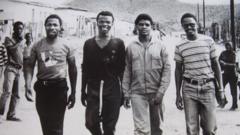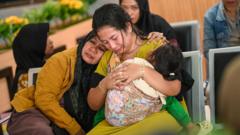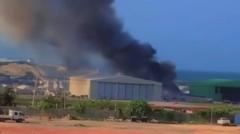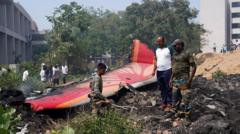In a landmark move shortly after the end of apartheid, South Africa's President Cyril Ramaphosa has initiated a judicial inquiry into the political dynamics affecting prosecutions of crimes from the apartheid-era, responding to longstanding calls for justice from victims' families.
South Africa Launches Inquiry into Apartheid-Era Crime Prosecutions

South Africa Launches Inquiry into Apartheid-Era Crime Prosecutions
Judicial investigation aims to unravel political interference in seeking justice for apartheid victims.
In a development that could reshape the approach to past injustices, President Cyril Ramaphosa has announced a judicial inquiry aimed at uncovering political interference in the prosecution of crimes committed during South Africa's apartheid era. This decision comes three decades post-apartheid and follows a lawsuit by survivors and relatives of victims, demanding accountability and justice.
The inquiry is a response to claims made by 25 families and survivors who have filed a $9 million lawsuit against the South African government. They argue that successive administrations failed to properly investigate the atrocities of the apartheid regime, as outlined by the Truth and Reconciliation Commission (TRC) established in 1996, which highlighted serious abuses including murder and torture. However, the actual number of cases that moved toward prosecution remained dismally low.
In a statement, Ramaphosa expressed his commitment to uncovering the truth, stating his determination for the matter to be concluded. The inquiry stems from discussions related to the high court case brought by the plaintiffs, whose distress over the lack of justice has echoed throughout the nation since apartheid's end.
Among the plaintiffs is the son of Fort Calata, one of the Cradock Four, a group of anti-apartheid activists murdered by security forces in 1985. Their killings ignited widespread outrage, leading to confessions in the TRC. However, to the dismay of many, the six former police officers involved, who were denied amnesty, faced no prosecution and have since passed away.
Critics have long alleged that the African National Congress (ANC), the ruling party, may have brokered agreements with former white-minority leaders to stall criminal prosecutions, a claim that the ANC has consistently denied. The announcement from the presidency acknowledged the existence of these longstanding allegations of political influence affecting justice processes.
Details regarding the inquiry's head and timeline are forthcoming, but the move reflects a significant step toward addressing the historical injustices that have plagued South Africa since its transition to democracy.
The inquiry is a response to claims made by 25 families and survivors who have filed a $9 million lawsuit against the South African government. They argue that successive administrations failed to properly investigate the atrocities of the apartheid regime, as outlined by the Truth and Reconciliation Commission (TRC) established in 1996, which highlighted serious abuses including murder and torture. However, the actual number of cases that moved toward prosecution remained dismally low.
In a statement, Ramaphosa expressed his commitment to uncovering the truth, stating his determination for the matter to be concluded. The inquiry stems from discussions related to the high court case brought by the plaintiffs, whose distress over the lack of justice has echoed throughout the nation since apartheid's end.
Among the plaintiffs is the son of Fort Calata, one of the Cradock Four, a group of anti-apartheid activists murdered by security forces in 1985. Their killings ignited widespread outrage, leading to confessions in the TRC. However, to the dismay of many, the six former police officers involved, who were denied amnesty, faced no prosecution and have since passed away.
Critics have long alleged that the African National Congress (ANC), the ruling party, may have brokered agreements with former white-minority leaders to stall criminal prosecutions, a claim that the ANC has consistently denied. The announcement from the presidency acknowledged the existence of these longstanding allegations of political influence affecting justice processes.
Details regarding the inquiry's head and timeline are forthcoming, but the move reflects a significant step toward addressing the historical injustices that have plagued South Africa since its transition to democracy.






















